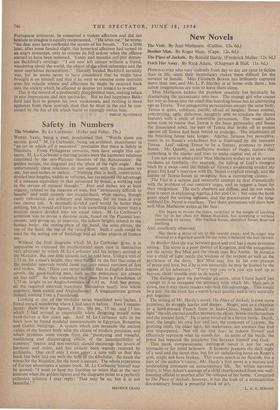Beckford's Travels
WILLIAM BECKFORD wail§ 'man whom every circumstance contrived to promise a happy and successful life. He was one of the wealthiest men in England, by birth he could take his place in the highest walk§ of society, in talent and intellect he was exceptionally gifted. His education was equally select; in the elements of architecture he was trained by Chambers, in painting and drawing by Cozens, in music by Mozart, claiming indeed to have originally conceived the theme of Non piu andrai which Mozart later filched and placed with scant acknowledgement in The Marriage of Figaro. Yet in everything Beckford did was present the same fatal silliness, a fundamental instability, emotional and intellectual, which was to cripple his hopes
of happiness. • • In 1784 Beckford was involved in a scandal with William Cour- tenay, an effeminate youth eight years Ir:s junior. Boycotted by society, he was condemned to roam Europe, an exile, meeting in every capital the icy hostility of his compatriots. His style of travel- ling befitted an English gentleman and millionaire of the eighteenth century: "There is such a fuss when I move, such a to-do with cooks and Maitres d'hotel and the Lord knows who.... " In 1787 his caravan arrived at Lisbon and this journal, published for the first time in its original form, deals with the ten months or so he passed in Spain and Portugal. The local aristocrats greeted him delightedly in Lisbon•only the British Ambassador, Sir Robert Walpole, met him with stony disapproval. The intrigues of Beckford and his friends to secure the former's presentation to the Queen and the adamant opposition of the Ambassador who, by etiquette, alone could make the introduction, supply the main theme of what is otherwise a simple travel record.
To those interested in eighteenth-century Spain and Portugal, the last flourish of the old regime .before the Napoleonic deluge, this book, with its efficient and unobtrusive annotation by Mr. Boyd Alexander, is essential reading. However great his faults Beckford was never dull, and the flamboyant grace of writing which he showed in Vathek did not desert him in his journals. A bullfight; a theatre; the worst dinner ever served, "dish-clout soup, wizzled chicken and flabby turbot"; always Beckford's writing is vivid and his observa- tion keen.
But the journals are of still more interest as a study of failure, of brilliant promise unfulfilled. "My young vivid friend," wrote Chatham in 1773, "is .as'much compounded of air and fire as he was. A due proportion of terrestrial solidity will I trust, come and make him perfe-ct." It never came. Beckford's essential instability is apparent in every page he wrote, nowhere more perhaps than in•his judgement of individuals.; For Don Pedro, a thAcen-year-old
Portuguese aristocrat, he conceived a violent affection and did not hesitate to imagine it equally reciprocated. He loves me," he wrote, "his dear eyes have confessed the secrets of his bosom." Yet a little later, after some fancied slight, this hysterical affection had turned to an angry contempt, only to resume its full ardour when the offence seemed to have been removed. Vanity and maudlin self-pity domin- ate Beckford's writings: "I am now left almost without a friend, wandering about the world, the object oftke vilest calumnies and the most capricious persecutions." Harshly 'treated Beckford certainly was, but he seems never to have considered that he might have brought it on himself and that if he were to exercise some restraint over his volatile whims and affections he might be received back into the society which he affected to despise yet longed to re-enter.
This is the record of a profoundly disappointed man, seeking solace in new impressions and new spectacles. But to find happiness Beck- ford had first to govern his own weaknesses, and nothing is more apparent from these journals than that he must in the end be con- sumed by the fire of life which burnt so strongly within him.
PHILIP SANDEMAN



















































 Previous page
Previous page